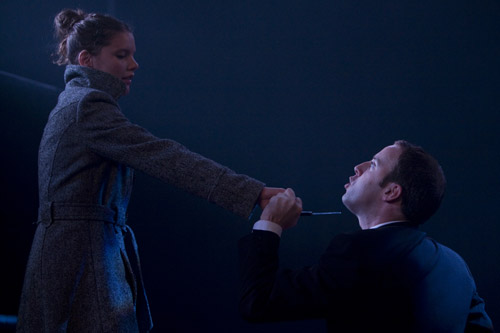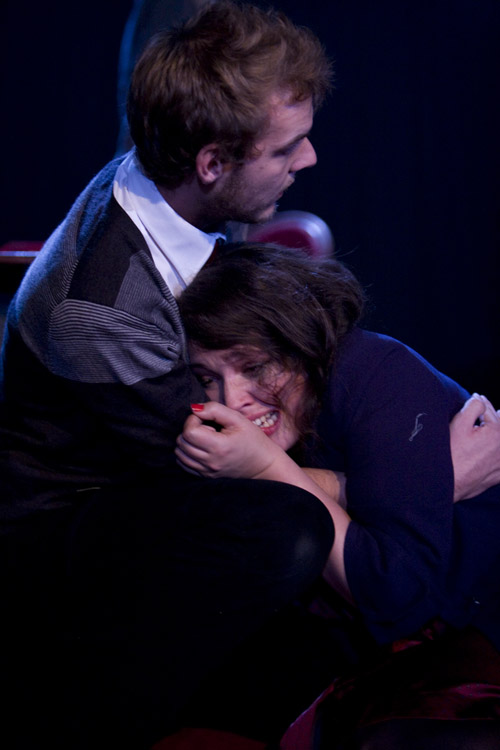
Richard III, presented by Love & Madness at the Central Theatre, Chatham, Kent, United Kingdom, 17 November 2010. Touring the UK and Ireland from September 2010 to April 2011.
Thomas Larque
thomas.larque@lineone.net
Thomas Larque. “Review of Richard III, presented by Love & Madness at the Central Theatre, Chatham, Kent, United Kingdom, 17 November 2010." Early Modern Literary Studies 15.2 (2010-11): 21.1-5 <URL: http://purl.oclc.org/emls/15-2/revric.htm>

Iarla McGowan as Richard III and Aimee Parkes as Lady Anne. Photographer: Luke Varley.

David Hughes as Rivers and Madelaine Hyland as Queen Elizabeth. Photographer: Luke Varley.
Directed by Ben Kidd. Casting by Irene East. Set Design by Annette Sumption. Lighting by Paul Green. Sound by Sam Ward. Technical Management by Kt Milne. Movement Direction by Jen Malarkey. With Will Harrison-Wallace (Clarence, Hastings), David Hughes (Rivers, Tyrell), Madelaine Hyland (Queen Elizabeth), Nicholas Kempsey (Queen Margaret, Richmond), Gareth Llewelyn (King Edward, Stanley), Iarla McGowan (Richard III), Aimee Parkes (Catesby, Lady Anne), and Joe Wredden (Buckingham).
- Love & Madness begin their touring production of Richard
III with a drunken office party. The smartly and expensively dressed partygoers
(both men and women in business suits) might be Conservative Central Office workers
celebrating an election win, or City bankers celebrating a particularly large
bonus, but instead they are King Edward and the Yorkists celebrating a victory
in the War of the Roses. As they stumble and mingle, Iarla McGowan’s Richard
moves from person to person, subtly working the room, the opening section of
his great first soliloquy transformed into a congratulatory speech. Unafraid of
mocking himself, Richard sits in the lap of Edward IV to embrace “this son of
York”, imitates the charging “barbed steeds” of War, and finally blows a long
blast on a party-horn to demonstrate the “lascivious pleasing of a lute”. At
this moment the lighting changes, the partygoers freeze, and Richard turns to
the audience to express his secret desires.
- Wheedling and ingratiating rather than charming, McGowan’s
Richard underlines the great paradox of Shakespeare’s play. How does a man
whose reputation and actions are so transparently vile inspire the trust or
loyalty of so many people within the play? For Joe Wredden’s smooth and
prosperous Buckingham, the answer is clearly self-interest. Hoping to rise with
Richard, he is delighted to become his public relations advisor, smilingly
delivering his lines into the microphone of an attendant journalist as he seeks
to persuade the gullible mayor and citizenry to support Richard’s coronation.
Aimee Parkes’s female Catesby, by contrast, is Richard’s committed personal
assistant, constantly wrestling with the documents and administrative work created
by killing and war; Richard’s only supporter in the final scenes, she has
evidently stayed up to collate the news of the two armies, seated at the
boardroom table at which Edward’s court met in 2.1. Tyrell, who takes the part
of all guards, murderers, and executioners is troubled by conscience, but still
commits every bloody deed on command. Most puzzling in this production is the
acquiescence of Lady Anne, who cannot possibly believe this Richard’s blatantly
dishonest protestations of love, and seems to accept him as her husband with a
fatalistic shrug, welcoming her impending death, her hatred unabated. She is
bullied rather than tricked into taking Richard’s ring, and seems to have no
appetite for vengeance: Richard’s offer of a blade does not seem the extreme
gamble that it has sometimes been in other productions, as she never shows any
willingness to use it.
- With a cast of eight, and only moderate doubling, the production
is heavily cut and characters amalgamated. It is a pity to miss Clarence’s
drowning in a malmsey-butt, which should make his premonitory dream of being
drowned at Richard’s hand a prophecy, and David Hughes – who plays Rivers and Tyrell
– is forced to lead himself to execution, alternating between kneeling prisoner
and standing executioner. Otherwise, the cutting and editing is judiciously
done, and the production flows smoothly, with the narrative appearing
consistent and complete. Nicholas Kempsey is particularly impressive in
shifting between his three roles, making the geekish bespectacled mayor
completely different from his clean-cut Richmond, and giving a tour de force
as Queen Margaret – bent double and rendered masculine by age and bitterness,
but still convincingly an old woman, clutching a bottle and spitting a cloud of
purple liquor at her enemies, an eerily inhuman and suitably ominous prophet of
doom and despair.
- The climactic scenes are impressively directed and choreographed.
Richmond’s camp is crowded with every actor except Richard, while Richard’s
lonely encampment is inhabited solely by himself and Catesby. As Richard tries
to sleep, the ghosts mill randomly around him, all speaking fragments of their
curses at once, endlessly repeating and echoing themselves until Richard
screams for a horse. As they prepare for the battle, Richard and Richmond
alternately speak sections from their orations. The battle is represented by
abstract movement, with the cast, excepting Richard and Richmond, standing in a
formation and each in turn miming being struck, and stumbling or falling
backwards. Richard walks confusedly between their milling bodies, seeking
Richmond, while Richmond stalks him from behind, dogging his heels until
Richard collapses to his knees, and Richmond symbolically removes Richard’s red
tie and fixes it around his own neck, representing the crown that transfers
between the two monarchs.
- Although travelling light (touring Britain and Ireland with Accidental Death of an Anarchist until April 2011), this production is an effective and entertaining Richard III, which makes a virtue of the necessities of small cast and modern costume. While the production is not always as accessible to inexperienced audiences as the company might hope (the presentation of the ghosts and the battle in the last scenes require prior knowledge of the play to be fully comprehensible), this is a welcome opportunity to see Shakespeare seriously performed in towns, such as Chatham, where straight drama for adults is relatively infrequent.
Responses to this piece intended for the Readers' Forum may be sent to the Editor at M.Steggle@shu.ac.uk.
![]()
© 2011-, Annaliese Connolly and Matthew Steggle (Editors, EMLS).